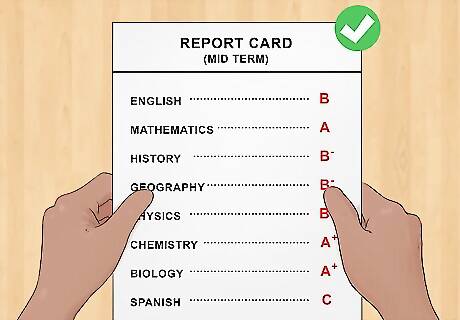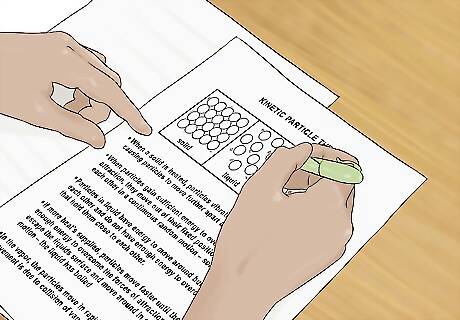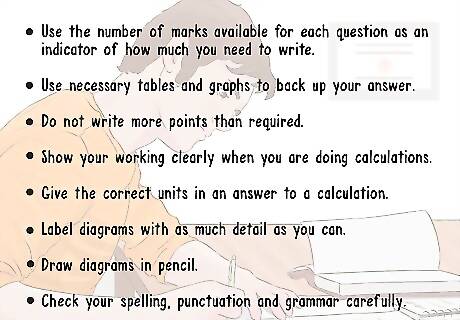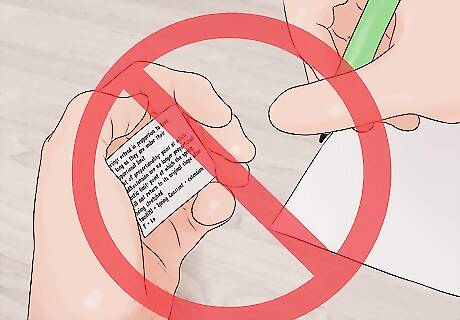
views
Developing a long-term strategy

Do your homework consistently during the year. When you do homework, you can test what you know on each subject, and you can look back at it for revision.

Keep it in your mind that you need to get grades from A-star to C, because a D or lower is a fail.

Read voraciously. Every weekend, just read through the text. One chapter of each subject; whichever one you prefer, but, try not to repeat the same ones every time.

Use your holidays and vacation as a time to study. A steady, ongoing state of learning will have you more than ready by exam time, rather than trying to cram at the last minute. Those breaks during the year provide a more relaxing, yet still work-focused, time to keep preparing consistently. If you use these times to keep learning, you won't stress anywhere near as much as those leaving it all until the last minute.

Prepare in earnest from about six months, then really knuckle down at three months to go. This deeper learning and revision must begin well before the boards, so plan out a timetable and give up on about 90% of the fun you have been having at this point. It's serious study time! It may seem a long-term but it short in the bigger scheme of things and yet has such long-term impact, so dedicate yourself to the long-term outcome for the best.
Specific studying strategies

Listen to the teacher's explanation throughout the whole year. These will help you to retain the information and is useful to draw on in case you forget what something means. Make certain that you do not leave the classroom feeling confused or lost. You should be able to explain in your own words any concept that you learned in class.

Use the mid-year examinations to pinpoint your progress thus far. After the mid-year examinations, work on improving your grades. For example, if you get a C in physics (or biology or chemistry), work on getting at least a B; if you get a B in maths, try to work harder for getting an A and so on. Note: English is a language that you can't study. The only thing you can do to improve your skills is to read stories, books, magazines, newspapers etc. See "reading voraciously" as a strategy in Section One.

Keep concentrating in class, keep doing your homework and keep studying at home. Try to focus, even if you find that this is easier said than done.

Study in groups with friends. This is very helpful and could help you overcome any problems that arise.
Three months before the exams

Start reviewing, the learning is over. Look at the notes you took during the past couple of years. You need to remember it all.

Study really hard. For the next three months, read and learn all your textbooks (remember only the prescribed ones, there is no need to buy those guidebooks). Learn each and every definition. They will be in the test. You may need to limit some of your extracurricular activities, so that you have more time to study.

Review historic exams. For the last three months do and re-do the past papers from the last 20 years. Do them as many times as you can and check your answers from the marking scheme. Review all the tests and exams done in class and learn from your mistakes. Try to print out old IGCSE/GCSE papers, this way when it comes to the real exam you'll know how everything is organised. (Mostly from "Circle the answers" to definitions). You can mostly find past papers on your exam board's website, and there are many other sites which offer them too.
Sitting the exam

Make sure you eat well before the exam. Not eating could cause you to forget things, and you need to have the energy to work hard; some exams are about 2 hours long!

Write whatever you know in the exam. Try not to leave any questions blank. If you can't answer a question, don't waste time by hopelessly trying to figure it out. Move on, then come back to it later.

Know some of the important elements when doing the test. Some of these include: Run through the exam quickly before doing any questions, that way you know what questions are to come and you don't get a big shock. Use the number of marks available for each question as an indicator of how much you need to write. Don't write an entire paragraph for a one mark question, and don't write one short sentence for a six-mark question. Use information given in the question. Use tables and graphs if given to back up your answer. Answer the question. If there are two parts to a question ensure you answer both. Don't write more points than required: is it's a 3 mark question, write 3 points only; the examiner will not pick out the best points out of many. When asked to draw a line of best fit, draw a line which has the same number of points on each side and goes through as many points as possible. Show your working clearly when you are doing calculations. You will be awarded extra marks. Always give the correct units in an answer to a calculation. Always label diagrams with as much detail as you can. Draw diagrams in pencil as you may need to make changes later. When drawing graphs, always label the axes with their name and the units you are using e.g. Time (seconds). Check your spelling, punctuation and grammar carefully as there may be extra marks awarded for this.

Do not cheat. Never copy from neighbours and hidden notes because you will be cheating.

Reap the rewards. If you do all this, there is a very good chance of you scoring more than you ever thought you could.



















Comments
0 comment